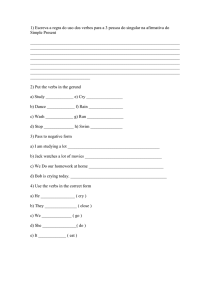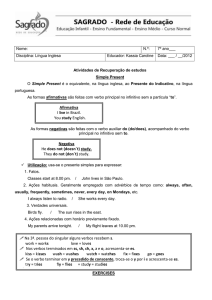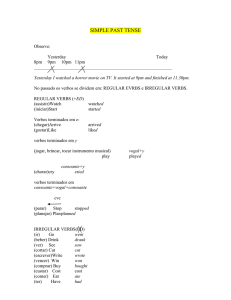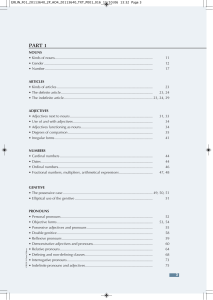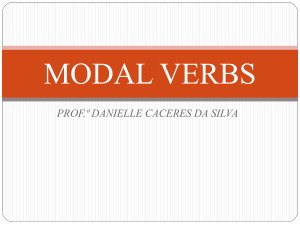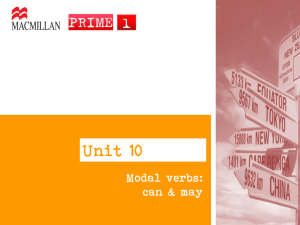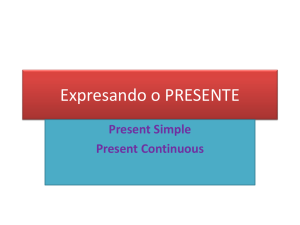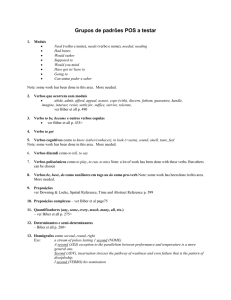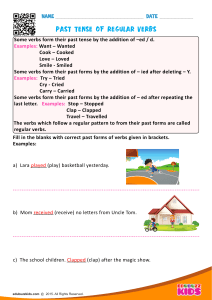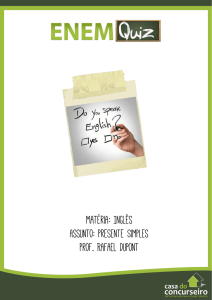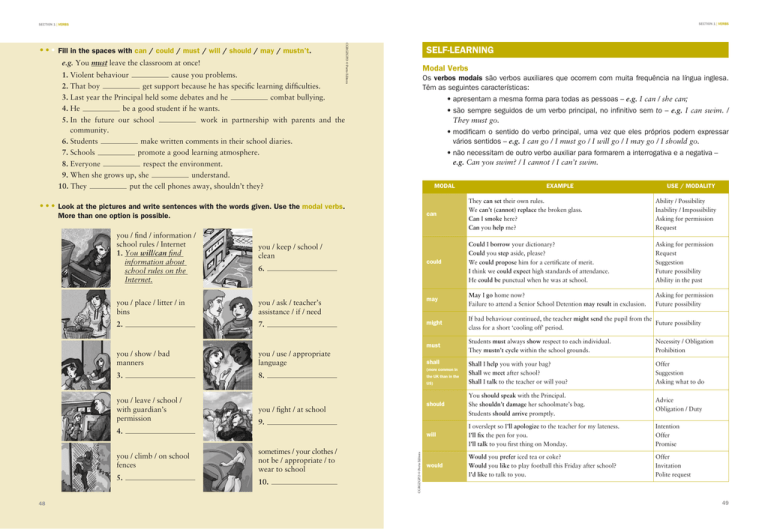
SECTION 1 | VERBS
SECTION 1 | VERBS
e.g. You must leave the classroom at once!
CGRGZGPI3 © Porto Editora
••• Fill in the spaces with can / could / must / will / should / may / mustn’t.
SELF-LEARNING
Modal Verbs
1. Violent behaviour
cause you problems.
2. That boy
get support because he has specific learning difficulties.
3. Last year the Principal held some debates and he
combat bullying.
4. He
be a good student if he wants.
5. In the future our school
work in partnership with parents and the
community.
6. Students
make written comments in their school diaries.
7. Schools
promote a good learning atmosphere.
8. Everyone
respect the environment.
9. When she grows up, she
understand.
10. They
put the cell phones away, shouldn’t they?
Os verbos modais são verbos auxiliares que ocorrem com muita frequência na língua inglesa.
Têm as seguintes características:
• apresentam a mesma forma para todas as pessoas – e.g. I can / she can;
• são sempre seguidos de um verbo principal, no infinitivo sem to – e.g. I can swim. /
They must go.
• modificam o sentido do verbo principal, uma vez que eles próprios podem expressar
vários sentidos – e.g. I can go / I must go / I will go / I may go / I should go.
• não necessitam de outro verbo auxiliar para formarem a interrogativa e a negativa –
e.g. Can you swim? / I cannot / I can’t swim.
MODAL
you / find / information /
school rules / Internet
1. You will/can find
information about
school rules on the
Internet.
you / keep / school /
clean
can
Ability / Possibility
Inability / Impossibility
Asking for permission
Request
could
Could I borrow your dictionary?
Could you step aside, please?
We could propose him for a certificate of merit.
I think we could expect high standards of attendance.
He could be punctual when he was at school.
Asking for permission
Request
Suggestion
Future possibility
Ability in the past
Asking for permission
Future possibility
6.
you / place / litter / in
bins
you / ask / teacher’s
assistance / if / need
may
May I go home now?
Failure to attend a Senior School Detention may result in exclusion.
2.
7.
might
If bad behaviour continued, the teacher might send the pupil from the
Future possibility
class for a short ‘cooling off’ period.
must
Students must always show respect to each individual.
They mustn’t cycle within the school grounds.
Necessity / Obligation
Prohibition
Shall I help you with your bag?
Shall we meet after school?
Shall I talk to the teacher or will you?
Offer
Suggestion
Asking what to do
should
You should speak with the Principal.
She shouldn’t damage her schoolmate’s bag.
Students should arrive promptly.
Advice
Obligation / Duty
will
I overslept so I’ll apologize to the teacher for my lateness.
I’ll fix the pen for you.
I’ll talk to you first thing on Monday.
Intention
Offer
Promise
would
Would you prefer iced tea or coke?
Would you like to play football this Friday after school?
I’d like to talk to you.
Offer
Invitation
Polite request
you / show / bad
manners
you / use / appropriate
language
shall
(more common in
3.
8.
the UK than in the
US)
you / leave / school /
with guardian’s
permission
you / fight / at school
9.
you / climb / on school
fences
5.
sometimes / your clothes /
not be / appropriate / to
wear to school
10.
CGRGZGPI3 © Porto Editora
4.
48
USE / MODALITY
They can set their own rules.
We can’t (cannot) replace the broken glass.
Can I smoke here?
Can you help me?
••• Look at the pictures and write sentences with the words given. Use the modal verbs.
More than one option is possible.
EXAMPLE
49

